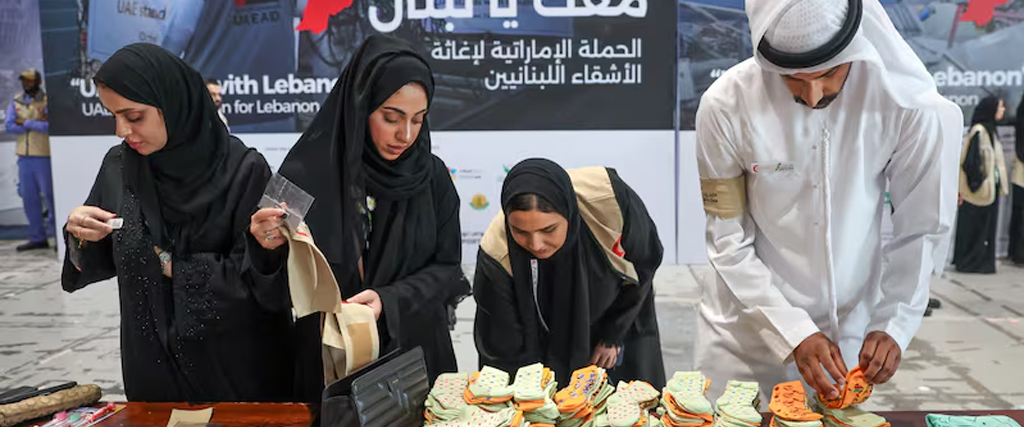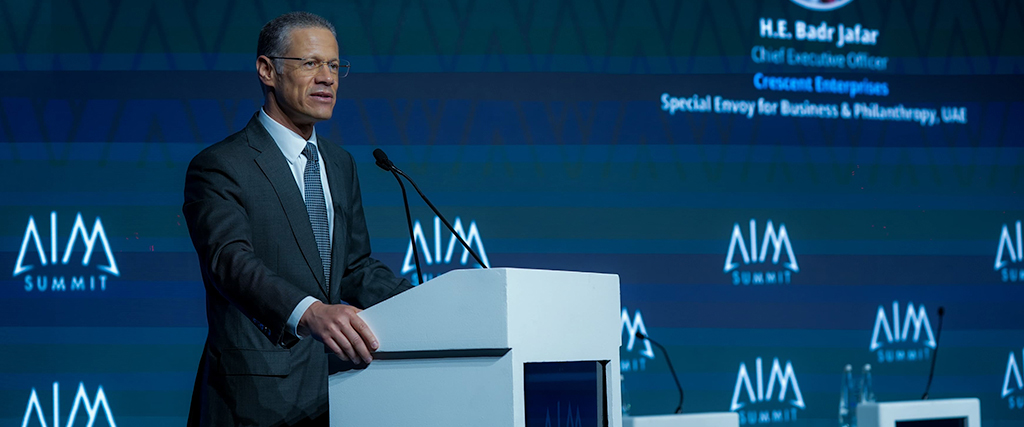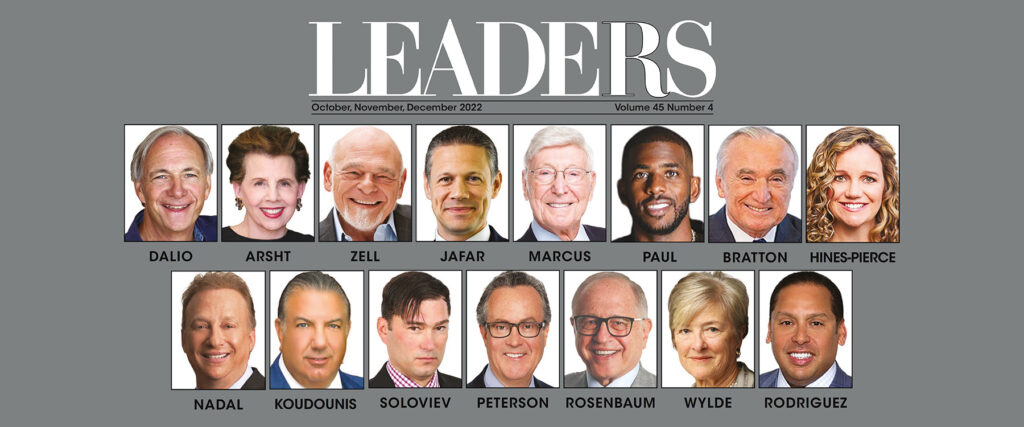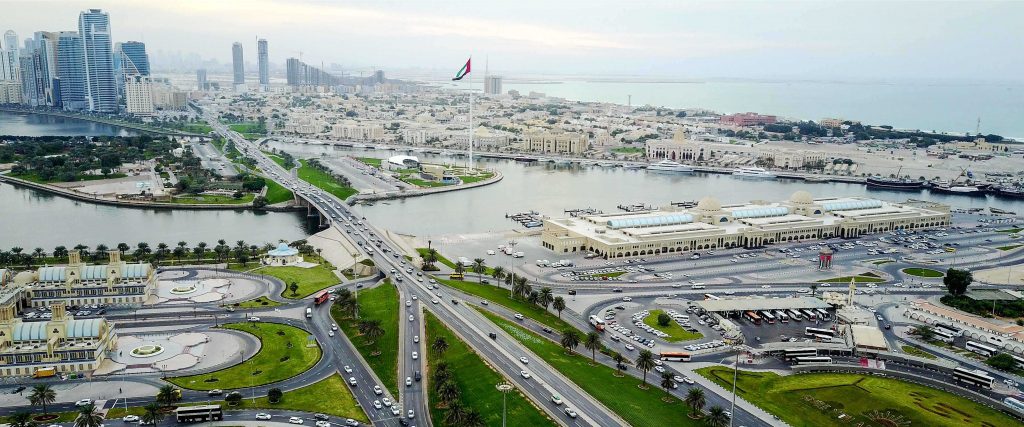Thriving in times of disruption: perspectives from the UAE
Maintaining social impact and continuing education were among the issues discussed at a recent event
London Business School took the bold step to open its Dubai campus in November 2007 at the onset of a global financial crisis. Fifteen years later and there are over 2000 alumni in the Middle East, thriving and proud to call LBS their home. Many of those alumni were at the regional launch of the School’s £200m Forever Forward Campaign in Dubai, to hear business insights from two distinguished alumni.
Badr Jafar is CEO of Crescent Enterprises, the non-energy multinational division of the Crescent Group; Muna Al Gurg is Vice Chairperson and Retail Director of locally headquartered conglomerate the Easa Saleh Al Gurg Group. Both are heavily involved in activities that have a social impact, ranging from the Pearl Initiative, founded by Jafar to promote corporate governance and integrity within the Gulf region, to Al Gurg’s work as a member of the United Nations High Commissioner for Refugees Sustainability Board.
‘People, technology and governance are all essential foundations for organisational resilience.’
They discussed the same challenge as their counterparts at events in London and New York: how do you thrive in times of disruption? The conversation was moderated by Herminia Ibarra, Charles Handy Professor of Organisational Behaviour at LBS and author of Act Like a Leader, Think Like a Leader.
Three pillars of resilience
How do you build the resilience needed to deal with discontinuity? Jafar identified three key areas: “People, technology and governance are all essential foundations for organisational resilience. With social and environmental goals increasingly seen as two sides of the same coin, the edge of that coin is governance that ties everything together and empowers businesses to generate sustainable value creation over generations,” says Jafar.
People are the start and end point of any successful venture or organisation. Create an environment that encourages people to commit their passions and energies and they will work with you to weather the storm. Then there is technology. Although an essential enabler for any organisation, technology should be seen as a tool rather than the main driver of change. It is the people who use that technology that are the real agents of change. And we can choose to use technology for the betterment of humanity and our habitat, or just to exacerbate our human flaws.
A third factor, governance, is an issue particularly relevant to the region, Jafar said. “Because 85% of our regional non-oil GDP is generated by family businesses and the vast majority of those businesses are second generation or transitioning to the third generation. Research shows that traditionally the biggest destruction of value happens during these transitions. You lose about 15% moving from first to second generation and another 60% from second to third generation. A fundamental reason for this is a lack of appropriate governance systems to protect that transition.”
In the next 15 years there is going to be a global transition of wealth of $78 trillion in family businesses, Jafar noted, including $5 to 10 trillion in the region alone. The majority of that wealth transition will happen between second and third generations. “But what if we could build governance models that not only protected value but created a multiplier effect on that value?”
Maintaining social impact activities in times of stress
A challenge with improving areas such as governance is that when organisations face economically tough and uncertain times there is a tendency to “circle the wagons”, noted Professor Ibarra, halting activities that could be viewed as non-essential. This is when socially responsible organisational aims such as aligning profit and purpose, for example, can falter. How might organisations maintain these activities in difficult times, she asked, when many of the major societal challenges seem to require a response that goes beyond a primary focus on profit.
In an ideal world, these types of activities, such as focusing on particular areas of social impact, will be woven into the fabric of the organisation, suggested Al Gurg. Realistically, though, a crisis may mean a temporary switch in focus to keep the business going. The important thing is to resume those activities again as soon as possible. The break can even provide greater impetus. “We started the conversation around the diversity and inclusion programme within our business about three years ago but during the pandemic it did take a backseat, because the focus shifted to thinking about new ways of working and survival,” she said. “But once that crisis had subsided we went back to the drawing board and now there’s a huge focus on gender equality and diversity and inclusion.”
‘Education systems have a critical role to play in building resilience’
At the same time, said Jafar, remember that it is not a zero sum game, where there has to be a trade-off between profit and purpose. “If you believe in and can demonstrate the business case, behind adopting social purpose principles, for example, then nothing should fall behind the wayside when the going gets tough. On the contrary you might even feel that you have to double down on that because you see it as an intrinsic part of your offering and fundamental to generating not just social returns or environmental returns but financial returns as well.”
The role of education
Professor Ibarra pointed to the role of education in creating positive change. Jafar drew on his experiences participating in a UNESCO international commission on the future of education. “Education systems have a critical role to play in building resilience,” Jafar says. “We need to develop new models of education that are more human-centric, focused less exclusively on developing technical skills and more on developing people. We must place greater emphasis on mental health, self-confidence, cultivating empathy and compassion, critical thinking, and equipping our young women and men with soft skills that will serve them well no matter what happens to one particular industry or another.” While building technical capabilities is important, he believes we need more human-centric systems of education. As he put it, “We need to start building people up to be more focused on the kinds of things that can’t necessarily be learnt via Google – such as empathy, compassion, creativity, conflict resolution and critical thinking, for example. Potentially we would have far fewer problems in the world if we had more of those skills taught not just from a relatively young age but throughout our careers.”
Jafar also suggested an approach to education similar to that of professions such as medicine and law, with an initial foundation of learning supplemented by mandated continuing professional development. “The assumption is that you get a degree and you’re fit for life, but that isn’t the case today,” he said. “So perhaps you start with that educational foundation but are then required to refresh every certain number of years. And the organisation you’re working for would have an obligation both to allow time and pay for that.”
‘The people that will do well are likely to be those that are always ready to learn’
Building on Jafar’s comments, Al Gurg noted that intellectual flexibility, whatever level you are at, is crucial to corporate growth in a world that is ever changing. She gave an example from her organisation where the Chief Marketing Officer had rapidly grown her team at headquarters from five to 20 people. In doing so she had noticed that the new team members had skills that she wasn’t fully up to speed on and so she enrolled on an LBS digital marketing course. Afterwards the CMO commented on how the course had made a huge difference, enabling her to ‘speak the language’ of every person on her team.
The example also emphasised the importance of being open to learning. “Continuous learning is crucial but so too is receptiveness to learning”, said Al Gurg. “The people that will do well are likely to be those that are always ready to learn, as opposed to those who are very defensive and think that they know everything.”
Questions from the audience
Following the panel discussion there was time for some questions from the audience. Responding to a question on the threat of technological unemployment, Jafar noted that concerns around technological unemployment are far from new. “Every technological revolution has been touted as an existential threat to our socioeconomic systems. But instead we’ve always experienced a net gain in opportunities and ultimately in employment – formal or informal. Whatever comes next there will be considerable opportunity to get engaged. The bigger question is: are we nurturing the skills needed to take advantage of these opportunities?”
When asked about their leadership styles, Al Gurg spoke first about the accessibility of leaders. “Having a very flexible and open way of leading is really important on all levels, in person or through other forms of communication,” she said. “I have an open door policy and try to be open and receptive and never ‘always busy’.”
As for Jafar, he identified diversity of minds as key to success. “We’re all unique but can we bring our uniqueness together and create something greater than the sum of our parts? Relentlessly trying to figure out how to surround yourself with people who have different views, different perspectives, different skill sets, that’s what creates successful organisations and systems.”
And that’s something that has to be worked at, added Professor Ibarra, as it’s not a human tendency to surround ourselves with difference and challenge.
As published in London Business School.
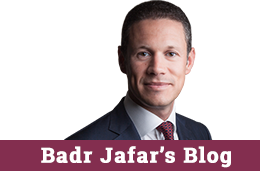
 Tweets by @BadrJafar
Tweets by @BadrJafar
